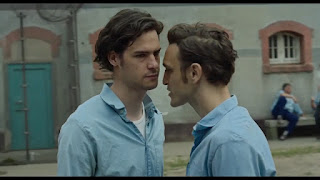Sound of Metal / 2019 / Directed by Darius Marder
A suffering man (Ruben- Riz Ahmed) is achieving worldly success, with all the joy and release that this can bring. He is in a great band with a woman he loves, and they're on tour in the best motorhome. But then a keystone of that world is taken away (his hearing) and the success dissolves. At first he fights uselessly against this cataclysm, but at length he humbles himself, and enters the Kingdom of God.
(I know from my own experience that eternity makes the mortal sick, you painfully purge your pride and self-hatred as you draw toward it. Before I was baptised I literally vomited up black stuff for a few days.)
I really felt that the deaf community here didn't so much represent the church, but rather actual heaven. Joe (Paul Raci) is a kind of priest-leader of the community. And, if they were following the ways of the flesh, they would certainly be a cult (it is a 'high-demand' group, taking your phone and car keys away on entry!). However, they're not, and Joe is Christ-like in the searching love that does not spare Ruben the fierceness of the highest hope. Joe makes him go into an empty room and either find stillness or write. It is the torture of healing. Ruben is able to open up, soften his heart, and become a part of the Kingdom.
And yet, he is drawn back to the world. And not just to be in it, but to once again be of it. He hasn't given up on his attachment to the successful arrangement he experienced before. In a lovely twist on the new testament's injunctions, he has to sell everything he owns to go back to the world! He pays to have implants which give him a tinny, painful form of hearing sound. It is a mockery of hearing, really, but it is what he needs to speak to his girlfriend Lou (Olivia Cooke) and win her back. Before he is ejected from the community, Joe says to him that the stillness is the Kingdom (basically giving him the keys to get back).
I found the final scenes with Lou unbearably moving. As Ruben sees that he cannot go back to the former life he had, he has the gentleness and wisdom to change his interaction with her from the worldly 'winning her back' to the spiritual act of thanking her for saving his life through her love. She has the same message for him.
Ruben leaves. He has nothing now. He sits on a bench. Oppressed by the imitation of hearing that the implants provide, he rips off the apparatus, and immediately finds himself in that stillness again (brilliantly evoked by cinematographer Daniel Bouquet) — i.e. in the Kingdom. When I watched this final scene, I realised that the camera has been finding this stillness (characterised by a certain kind of watchful 'listening') at intervals throughout the drama. Having given up hearing in the flesh, Ruben again has 'ears to hear', and he returns to what Joe and the others were leading him toward. He doesn't exclaim 'Oh look, there it is!' because it has always been there (Lk 17.21).



Comments
Post a Comment